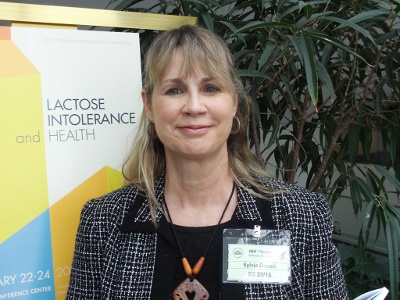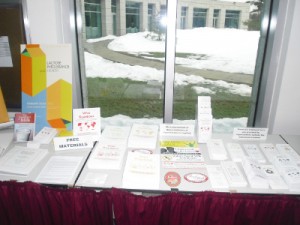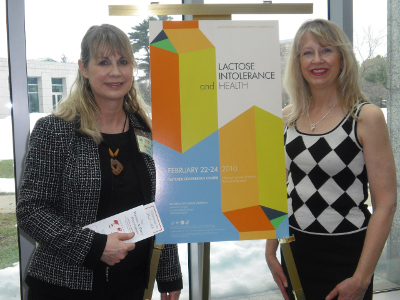
Sylvia Onusic, PhD. Nutritionist
We All Agree Dairy is Crucial to Human Health-But Which Dairy?
By Sylvia P. Onusic, PhD and Kimberly Hartke, Weston A. Price Foundation Publicist
It was a BIG push to include more pasteurized/homogenized dairy into the lives of Americans, even those who experience adverse physical symptoms called “lactose intolerance” by experts at the NIH Consensus Conference, “ Lactose Intolerance and Health,” held at the National Institutes of Health in Bethesda, Maryland, February 22-24.
The experts presenting at the conference built a case for the vital importance of dairy in the human diet, and stressed the idea that those who avoid dairy are setting themselves up for major nutrient deficiencies, particularly of vitamin D and calcium (what they neglected to say, is that artificial Vitamin D is added to processed milk while it is naturally contained in fresh farm milk.) They also stressed that Blacks and Asians and their children are more likely to avoid conventional dairy milk because of the high incidence of lactose intolerance among them, and as a result, are likely to be deficient in these nutrients.
Lactose intolerance results in lactose malabsorption, an inability to digest the sugar in milk called lactose because of lack of the enzyme, lactase. Normally lactose breaks down in the gut into simple sugars. But without the enzyme, the lactose ends up being fermented by bacteria in the colon, which causes the digestive symptoms of bloating, cramps, excessive gas and discomfort.

NIH Gave us Free Exhibit Space at the Event
Sylvia Onusic and I were there to represent the Weston A. Price Foundation. The conference was a great opportunity for us to educate dieticians, physicians, and academic experts. Our message was that almost 80% of those who experience lactose intolerance find that they can drink farm fresh milk with no problem, because it contains the enzyme lactase. We also explained that many whose ancestors drank fermented milks (in which lactose is pre-digested by pro-biotic bacteria,) such as kefir or clabber, will do best to seek out these traditional forms of milk for themselves.

Attendees Passed by our Booth on the Way into the Conference
Although a great deal of time was devoted to lactase at the conference, according to Sylvia who attended the sessions, “no panelists presented information on studies, personal observations, or interviews with patients regarding this simple yet effective solution of drinking a source of natural lactase as contained in fresh milk from the farm.”
Our booth was very effective in filling that gap in the conference program. Nearly everyone attending the conference took our Campaign for Real Milk brochure (we offered it to them on their way in and out of the conference). Many others visited our booth and took our membership brochure and other materials, Soy Alert, How to Fight Cancer with Food, and Myths and Truths about Cholesterol. Back issues of Wise Traditions Journal and Ron Schmidt’s book, The Untold Story of Milk, were also eagerly snatched up until they were all gone!
Interestingly, the lactose intolerant individuals were the most open to our message, and were hungry for answers. A number expressed interest in securing access to raw milk.
An angry woman confronted us, as well as the NIH staff, about our presence there. She felt it was inappropriate for us to promote raw milk in a state where it is illegal to sell it. Fortunately, NIH staff were very firm about our free speech rights and defended their decision to invite us to exhibit. (See my response “Letter to an Angry Lady.”)
Speakers talked about “perceived lactose intolerance” in the patient and the fact that patients don’t have lactose intolerance unless diagnosed by a physician. But common sense tells us that if the milk hurts, people will avoid it, whether they have gotten an official diagnosis or not. Expert participants in the audience brought out the fact that the test which confirms this “diagnosis” can easily give false negatives if the patient was recently on antibiotics or has a varying strain of bacteria in the colon.
People may have an allergy or intolerance to the altered protein in processed dairy, not the lactose, but this was not discussed, only in a passing comment.
The panelist-speakers were primarily academicians with ties to pharmaceutical companies or food manufacturers and trade associations.

Happy to Tell the Raw Milk Story at NIH
No distinction was made between types of milk, pasteurized, homogenized, or powdered. Nor did any speaker explore the effect of homogenized milk on lactose intolerance. A physician expert even promoted strawberry and chocolate milks, high in sugars and containing artificial additives, as a way to get more dairy into children. Cheese and yogurt were also mentioned several times as options for getting the nutrients of concern.
The farm fresh milk industry continues to grow as consumers discover the health benefits of fresh milk which comes from cows which are treated humanely and fed appropriately. We felt privileged to be at this conference to carry this message to health professionals and academic researchers. We hope we put farm fresh dairy on the table for future discussions.
To see the final statement issued by the consensus conference, visit this link:
http://consensus.nih.gov/2010/images/lactose/lactose_draftstatement.pdf
Sylvia P. Onusic holds a PhD in Health Education and Nutrition. She has completed all coursework to qualify for Registered Dietician. She is also a certified nutrition teacher in Pennsylvania and has taught nutrition in local high schools and on the university level. She is a member of the American Society for Nutrition, PASA- Pennsylvania Sustainable Agriculture, and Weston A Price Foundation. Sylvia will be speaking at the upcoming Raw Milk Symposium, to be held in Wisconsin April 2010, on Raw Milk Perspectives in Europe.
Kimberly Hartke is the publicist for Weston A. Price Foundation, a nutrition education non-profit, and their Campaign for Real Milk, an effort to educate the public about the health advantages of unprocessed milk from traditional, pasture-based dairy farms. Visit realmilk.com for more information.



That’s great! Sounds like the two of you managed to open at least a few eyes
Just launched today, The Second Annual Raw Milk Symposium:
http://www.rawmilksymposium.org/
Check it out, be there!